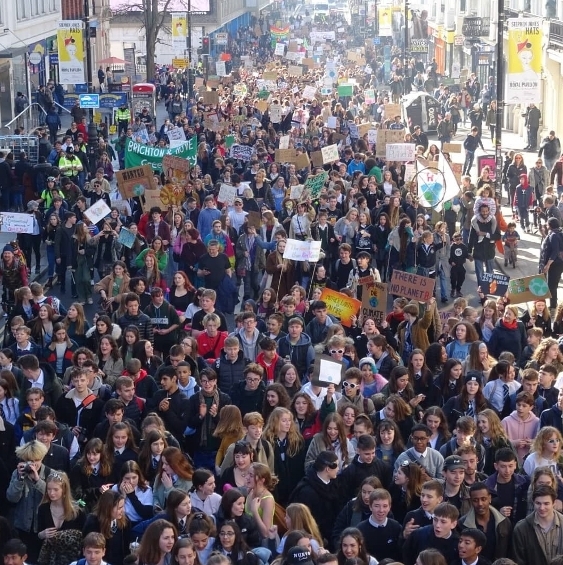By Harry Nathan
For decades, climate change has been ignored, or sidelined, by our political elites. For decades, the crisis has grown worse, and the consequences more catastrophic. Now, we stand on the edge of collapse, with just a couple of decades left to save human civilisation as we know it.
Warming has already reached 1.3°C, and we’re predicted to reach 2°C by 2035, and 5°C by 2050. What does this mean? Well, the International Panel on Climate Change (IPCC) has warned that 2°C of warming will result in “irreversible climate damage”, more specifically that it may trigger unpredictable ‘feedback loops’ that will prove to be uncontrollable and, thus, result in run-away global warming.
So, what about 5°C? The IPCC, Greenpeace and Extinction Rebellion all largely agree that 5°C of warming would result in the collapse of “organised society” – in other words, the end of human civilisation as we know it. The status quo has no future – ‘business-as-usual’ means the end of organised society.
Time is running out fast; if we are to mitigate the worst effects of ecological collapse then we must act now.
There is one final chance to avert the coming catastrophe, but it’ll take a social effort on a scale not seen in any of our lifetimes. It will take a union of green and red politics – what one of my friends called the “Christmas Alliance”. The Green New Deal must incorporate and combine green politics of ecology – shifting to renewable energy, changes in agriculture and rewilding – with red politics of public ownership – placing the benefits of ‘Green technology’ with society as a whole. Alone, traditional red politics, based on the continuation of fossil fuels, will fall victim to the climate crisis, exposing the world’s poor to devastation on a scale never imagined before. Likewise, green politics alone will not be able to command the popular support necessary to make change, on the required scale, possible. Moreover, green politics alone cannot solve any of the economic or social issues which contribute to environmental disaster. Thus, any Green New Deal brought forward cannot exclude either side. This is the basis of the truly radical Green New Deal which our planet so desperately requires.
The overarching goal of everything within the Green New Deal is to achieve complete global decarbonisation by 2040. True, this only gives us twenty years to achieve something incredible, however, because of the inertia of the last half-century, we no longer have time for gradual change. Evolution is out. Revolution is in. What is the roadmap and timeframe for decarbonisation? The twenty-year period, at the end of which we must have achieved global decarbonisation, is split into two ten-year periods. In the first ten years (2020-30), the West (Europe and North America) and other economically advanced states (China, Australia, New Zealand, etc…) must decarbonise. We have to recognise that these states – because they industrialised first – have experienced the benefits of fossil fuels for much longer; moreover, as a result of this, they have also done more damage to our environment than states who have industrialised much later (or have not yet industrialised at all). Therefore, the West has a moral responsibility to lead the way in climate action. Additionally, in simple economic terms, Western states are more capable of making the transition to a carbon neutral society, for no other reason than they have developed more advanced and larger economies through more intensive exploitation our of planet and people.
In the second ten-year period (2030-40), the rest of the world will follow suit and decarbonise. Those states who completed the transition in the first period will be able to assist the rest of the world, however, we must avoid a neo-colonialist approach to decarbonising the world. It is not for the West to ‘instruct’ the rest of the world on how and when to decarbonise. What we can do, however, is offer our support, provide other states with the technology which we used to decarbonise and generally stand in solidarity with them against the oncoming storm of ecological disaster. Crucially, this means the West must be prepared to take in ever increasing numbers of ‘ecological-refugees’, fleeing the destruction of a collapsing environment. It is imperative that between 2030 and 2040, the world becomes completely carbon-neutral, however, it is also crucial that we avoid slipping into neo-colonial thinking. The place of the West is to lead by example, aid where needed, and to stand in solidarity with the World, not to instruct the World on what to do and how.
The current international political system, based on the dominance of the West and, in particular, the post-imperial powers, has done little more than stall progress since its inception in the mid-1940s. The United Nations (UN) is but an extension of state power; it is near impossible to get anything done if it conflicts with the interests of one of the five states who hold a veto (USA, UK, France, Russia and China). Moreover, institution such as the IMF and World Bank are there merely to promote the hegemony of neo-liberalism in the global economy. In order for the kind of mammoth political, economic and social change that we require to be possible, we need a new international political system, based upon full equality among states, one which removes the privileges of the more developed and richer states. Only by doing this can we get these states, who currently control the international system, to give up their privileged position and lead the way in global decarbonisation. Alongside this restructuring of the system, we also need a new Green Global Investment Bank (GGIB) to help fund the transition and provide guidance to states which require it. How will the GGIB get funds to spend on this development? Through a Global Carbon Tax (GCT). The GCT will encourage states to reduce their greenhouse gas emissions (GHE) by charging all states a fixed amount per tonne of GHE. Thus, the GCT has a dual purpose: one, to provide funds to help the global transition; two, to provide an incentive for states to reduce their GHE.
We have an admirable goal – complete global decarbonisation – but how can we actually achieve it? The bedrock of change is altering the energy paradigm. Since the Industrial Revolution in the early 19th-century, burning fossil fuels has been our primary source of energy – this is called the “Fossil Paradigm”. What we now need is a paradigm shift, away from the Fossil Paradigm and towards the Renewable Paradigm. This not only has important environmental consequences, but also economic and demographic connotations. The current human population, of seven billion, consumes between 17 and 18 terawatt-hours (TWh) of energy every hour. This current level of consumption has already pushed us into crisis. Now consider that our population is expected to rise to approximately ten billion by the middle of the century; if our current energy demands are already unsustainable, how will we accommodate an increase of, at least, three billion more people? One solution, favoured by the Right, is population control. I think we can all agree that this is not acceptable, but, there is an alternative; 87,000 TWh of potential solar energy hits the Earth’s surface every hour. Now, while we don’t currently have the capabilities to harvest all this energy, it does mean we have a supply of energy far in excesses of our current, and future, demands. Therefore, even without the vital environmental impact of renewable energy, it is the best demographic option for a planet with a constantly growing demand for energy. Fossil fuels simply cannot keep up with this growth in demand. Moreover, the cost of renewable energy, once trumpeted as the gravest barrier to its use, has almost completely evaporated as a meaningful barrier. While the cost of producing energy from coal currently stands at $102 per megawatt-hour (MWh), the cost of producing one MWh of solar energy is just $50. In addition, the average cost of solar panels has dropped by 76% since 2009. Almost equally important are the lithium-ion batteries used to store solar energy – the cost of which has fallen by 50% between 2014 and 2017. Thus, for these demographic and economic reasons, renewable energy is the future, the only remaining question is in whose benefit will this be implemented, the people or the corporations?
There is a possible turn of events in which the capitalist system assimilates Green technology for its own benefit; in which we may be able to avoid the very worst impacts of ecological collapse, but where social and economic issues are merely perpetuated. Indeed, it is in the interests of the energy corporations to adopt Green technologies in order for them to boost their profits. As discussed above, solar energy is rapidly becoming a far better economic option than fossil fuels. By adopting solar energy, these corporations could increase their profits by reducing the cost of generating energy. Nevertheless, in this scenario, energy would likely follow the paths of other industries, such as pharmaceuticals. Because of the abundance of potential solar energy, the value of energy would be close to zero should we begin to harvest it effectively (value decreases as quantity increases), thus these corporations shall have to find other ways to artificially impose energy scarcity. Most probably this will be by using patents on Green technologies to reduce widespread use of them. In this model, while we may avoid the very worst consequences of the climate crisis, the full potential of the Green New Deal cannot be realised, and social and economic issues will not be addressed. Climate crisis is a symptom of a decaying economic system – if the system is the root cause then it is the system which we must change.
What we must do is build an alternative system, one which puts conserving the environment and providing every member of society with comfortable and fulfilling lives at its core. This is the criteria upon which our new economic superstructure must be judged. While for some it is easier to imagine “the end of the world than the end of capitalism”, if we do not end capitalism then the world will indeed end. The current economic system is based around the dominance of massive global corporations – such as Google, Amazon or McDonalds – the goal of the Green New Deal shall be to shift the balance of power towards locally orientated worker-led cooperatives which would give local people more power and make business more accountable to local people. Moreover, this new model of economic composition will make business more grounded in local communities, keeping them more in-tune with their needs.
This model is called ‘localism’. Pioneered in Mondragon, Cleveland and Preston, in this model, local authorities direct spending from “anchor institutions” into the local area and economy. ‘Anchor institutions’ are ‘static’ institutions, meaning that they cannot move, such as schools, hospitals and universities. Localism was adopted in Preston after the collapse of a project to build a large shopping area. After the collapse, the local Labour Council decided to go with another approach and combat out-sourcing rather than continue promoting it. The difference to the local economy has been transformational; while in 2013, anchor institutions invested £38 million in the city, by 2017, this had risen to £111 million. Additionally, the local council has been encouraging anchor institutions to invest in Green businesses and cooperatives. The Preston Cooperative Network was set-up to provide start-up cooperatives with finance and to combat pay-day lenders, along with a not-for-profit energy company, Fairerpower Red Rose, to reduce energy costs for consumers and cooperatives. This model should be adopted on national levels by the Green New Deal; tied to massive increases in regional devolution. Within the UK, this would mean the creation of English regions and granting of substantially more powers to the existing devolved bodies. Moreover, each region would have its own Regional Investment Bank (RIB) whose role would be to encourage investment and development within the allocated region. RIBs would be limited by geographic area, meaning they could not invest in cooperatives outside the region they have been allocated too. In summary, localism offers an opportunity to combat out-sourcing – thus, restricting the power of large corporations – and empower local worker-led cooperatives and local communities.
Localism is only part of how we’re going to build the new economic superstructure, the other part is through Universal Basic Services. While Universal Basic Income (UBI) has become an increasingly popular potential policy, with the Labour Party pledging to trial it in several cities across the UK once they come to power, UBI is not an effective policy for compete economic restructuring. What UBI would do is merely provide people with more disposable income to spend in the same institutions which have caused the climate crisis. Make no mistake, we are in favour of UBI, but not alone. UBI must be implemented as part of a far-wider programme of reform; the mistake of many is assuming UBI can solve our problems by itself. Universal Basic Services (UBS), on the other hand, are a dynamic, 21st-century model of nationalisation. It is the public ownership of the aspects of the economy which are needed to solve the climate crisis and “provide every member of society with comfortable and fulfilling lives”. The most important of these are energy, transport and agriculture. However, other areas also include health and social care, education, utilities and housing.
While the benefits of a complete shift to renewable energy have already been discussed, what a UBS of energy would allow is for these benefits to be shared among the entire population, to benefit everyone. Should our collective efforts be put towards harvesting renewable energy, there is no doubt that we would have a supply of energy far in excess of our demands. The first phase of an energy UBS would be to provide every household with clean energy, this would mean the end of energy poverty. The second phase is to provide energy for all other UBS’s, while in the third phase, energy will be provided to worker-led cooperatives and other social projects – such as scientific research. Any surplus of energy after fulfilling these three phases shall be made available for any other needs required. This would not only mean the end of energy poverty, but also the end of the commodification of energy as well. Simply put, energy would become a public good, utilised in the interests of society as a whole.
Alongside energy, UBS of transport is perhaps the most vital aspect of the Green New Deal. There are an estimated one billion cars in use worldwide and, on average 100,000 flights per day (there were 37.4 million in 2014 alone!). Transport alone accounts for roughly 30% of global greenhouse gas emissions, meaning that this is an area which we simply cannot ignore; a key element of the Green New Deal must be to remove as many cars from our roads and as many planes from our skies as possible. Nationalising transport – just as with other areas – is already an extremely popular policy, renationalising the railways in supported by 76% in the UK. Moreover, localism means that local authorities would be able to manage UBS in transport for their local areas, rather than having large over-centralised monolithic institutions running our transport UBS’s. The Green New Deal will promote a number of modes of mass-transport systems, appropriate for the different areas they will operate in, including railways, monorails, tram and bus systems. Alongside this, there will be a massive expansion of cycling infrastructure, and the pedestrianisation of large city centres.
For the last half-century, our politicians have known about the threat posed by climate ‘change’, but they have done nothing. They will continue to do nothing unless we either force them into radical action or replace them. Charging 5p for plastic bags or banning plastic straws won’t solve the crisis. The system is the root cause; therefore, it is the system we must change. We cannot sit idly-by and wait for our politicians and governments to save us. We must save ourselves. Climate protests have been ongoing for some time now. Protests against inaction, against the use of fossil fuels and against capitalism itself. Protesting against the system is important; but there comes a time when you have to actually campaign for something. That something is the Green New Deal, localism and Universal Basic Services. The Green New Deal offers us the basis for an alternative society, one based on protecting our environment and providing every member of society with comfortable and fulfilling lives.





